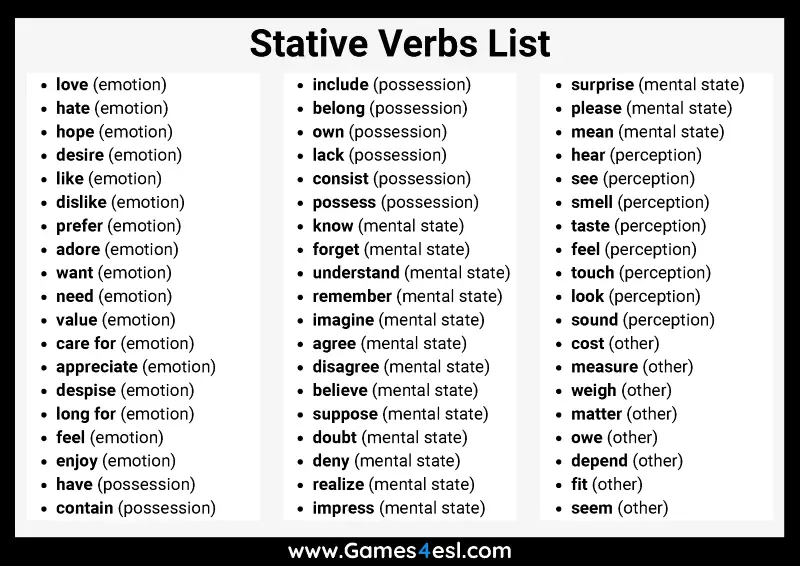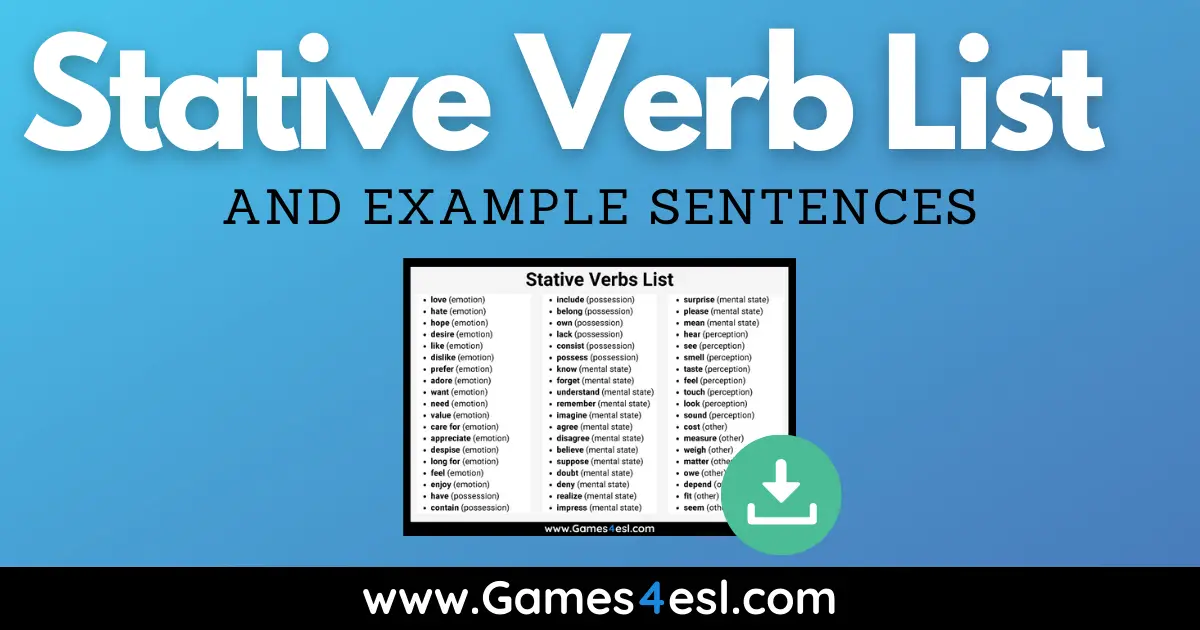Stative Verbs | List And Example Sentences
Unlike action verbs which refer to actual physical action, stative verbs describe a state. Stative verbs are used in sentences differently from action verbs, so it is essential for English language students to learn about them. To help you teach or learn about stative verbs, we have put together this extensive list of stative verbs together with many stative verb example sentences. But first, let’s look at exactly what stative verbs are.
What Are Stative Verbs?
A stative verb is used to describe a state rather than an action. Stative verbs show what state the subject is in. For example, in the sentence “Craig loves pizza, ” the stative verb ‘love’ describes the subject’s (Craig) emotional state.
As stative verbs describe a state, rather than continuous action, stative verbs are not used with continuous tenses, such as the present continuous and future continuous.
Types Of Stative Verbs
In English, there are 5 types of stative verbs. These are stative verbs of emotion (love, hope), possession (have, contain), mental states (know, forget), perception (hear, taste), and others (seem, matter).
Stative Verbs List

Here is an extensive list of stative verbs in English. The type of stative verb is indicated in brackets:
- love (emotion)
- hate (emotion)
- hope (emotion)
- desire (emotion)
- like (emotion)
- dislike (emotion)
- prefer (emotion)
- adore (emotion)
- want (emotion)
- need (emotion)
- value (emotion)
- care for (emotion)
- appreciate (emotion)
- despise (emotion)
- long for (emotion)
- feel (emotion)
- enjoy (emotion)
- have (possession)
- contain (possession)
- include (possession)
- belong (possession)
- own (possession)
- lack (possession)
- consist (possession)
- possess (possession)
- know (mental state)
- forget (mental state)
- understand (mental state)
- remember (mental state)
- imagine (mental state)
- agree (mental state)
- disagree (mental state)
- believe (mental state)
- suppose (mental state)
- doubt (mental state)
- deny (mental state)
- realize (mental state)
- impress (mental state)
- surprise (mental state)
- please (mental state)
- mean (mental state)
- hear (perception)
- see (perception)
- smell (perception)
- taste (perception)
- feel (perception)
- touch (perception)
- look (perception)
- sound (perception)
- cost (other)
- measure (other)
- weigh (other)
- matter (other)
- owe (other)
- depend (other)
- fit (other)
- seem (other)
- resemble (other)
Stative Verb Example Sentences
One of the best ways to learn how to use stative verbs is to practice with lots of examples. Here are many stative verb example sentences:
- I love pizza.
- Kelly hates sushi.
- Chris hopes to go to university.
- I like this song.
- Tom dislikes math.
- I prefer classical music to pop music.
- I absolutely adore french food.
- Do you want some more?
- I am so thirsty! I need some water.
- I really value our friendship.
- Craig really appreciates loyalty.
- Why do you despise me so much?
- I feel depressed today.
- Kelly enjoys walking in the rain.
- Do you have a pencil?
- Does this contain nuts?
- This meal includes a free drink.
- Who does this belong to?
- I own three cars.
- This movie lacks a story.
- John doesn’t know the answer.
- Did you forget the sandwiches?
- I completely understand.
- I can’t remember what we learned yesterday.
- Do you agree?
- Why do you always disagree with me?
- I truly believe it will be successful.
- Did you hear what she said?
- I can see that you have lost some weight.
- I can smell something burning.
- I taste a hint of lemon.
- I feel really cold.
- You look really beautiful today.
Related Resources
Thanks for reading. I hope this list of stative verbs and example sentences helps you. Before you go, be sure to check out these related resources:
English Grammar Exercises
Analytical Verb List
Descriptive Verb List
Imperative Verbs List
Irregular Verb List
Past Tense Verb List

